Removal Procedure
Caution: An electric fan under the hood can start up even when the engine is not running and can injure you. Keep hands, clothing and tools away from any underhood electric fan.
Caution: To help avoid personal injury or damage to the vehicle, a bent, cracked, or damaged fan blade or housing should always be replaced.
- Disconnect the negative battery cable. Refer to Battery Negative Cable Disconnection and Connection in Engine Electrical.
- Disconnect the cooling fan electrical connector.
- Partially drain the cooling system. Refer to Cooling System Draining and Filling .
- Remove the LH and RH engine mount strut braces. Refer to Engine Mount Strut Replacement in Engine Mechanical - 3.1L or Engine Mount Strut Replacement - Right Side and Engine Mount Strut Replacement - Left Side in Engine Mechanical - 3.8L.
- Remove the air cleaner and duct assembly. Refer to Air Cleaner Assembly Replacement in Engine Controls - 3.1L or Air Cleaner Assembly Replacement in Engine Controls - 3.8L.
- Remove the radiator inlet hose from the radiator.
- Remove the powertrain control module (PCM) harness from the fan shroud clip.
- Remove the cooling fan shroud bolts.
- Raise and support the vehicle. Refer to Lifting and Jacking the Vehicle in General Information.
- Remove the push pin retainer from the lower left side of the fan shroud.
- Remove the transmission oil cooler lines from the retainer clip at the bottom of the cooling fan shroud.
- Lower the vehicle.
- Remove the cooling fan shroud clip from the top of the radiator.
- Remove the radiator upper support brackets that connect to the fan shroud.
- Remove the fan motor heat shields L36 and L67.
- Remove the cooling fan shroud.
- Inspect the cooling fan for the following conditions:
- Remove the cooling fan blade nuts.
- Remove the cooling fan blades.
- Remove the cooling fan motor bolts.
- Remove the cooling fan motors.
Caution: Refer to Battery Disconnect Caution in the Preface section.
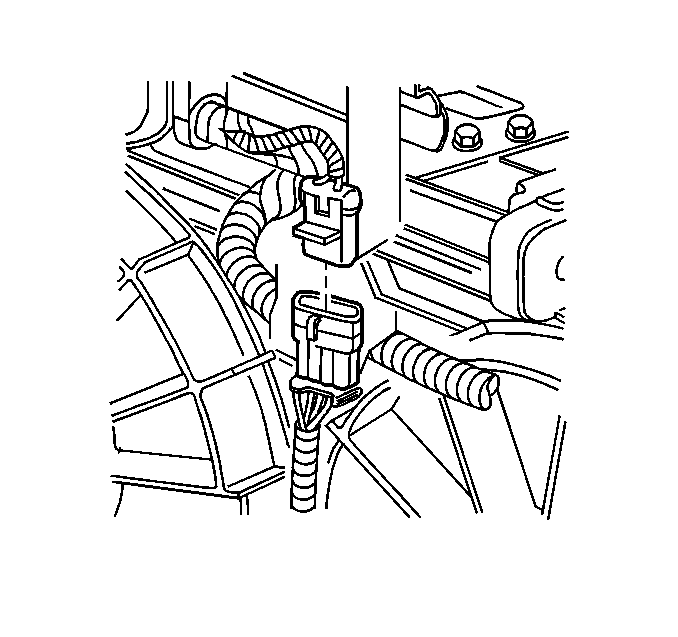
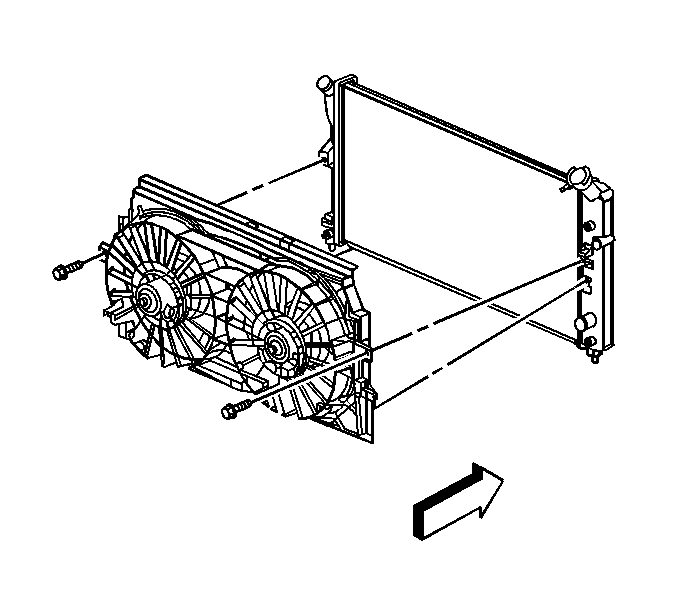
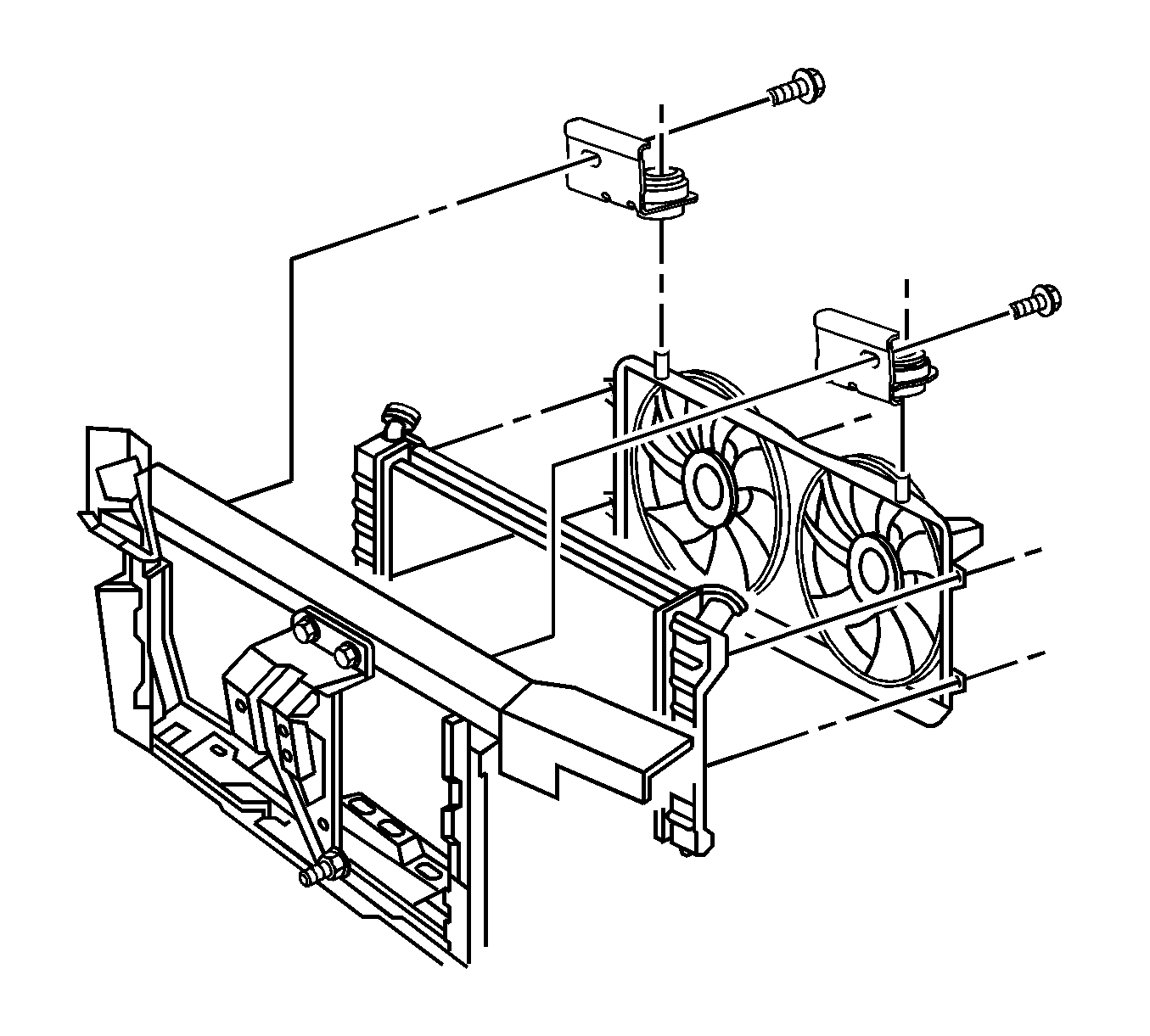
Caution: If a fan blade is bent or damaged in any way, do not repair or reuse the damaged part. Always replace a bent or damaged fan blade. Fan blades that have been damaged can not be assured of proper balance and could fail and fly apart during subsequent use. This creates an extremely dangerous situation.
The fan blades must remain in proper balance. You cannot assure fan blade balance once a fan blade has been bent or damaged. A fan blade that is not in proper balance could fail and fly apart during use, creating an extremely dangerous situation.| • | Bent or cracked cooling fan blades |
| • | Smoothness of the cooling fan blade mating surfaces |
| • | Remove burrs or other imperfections as necessary |
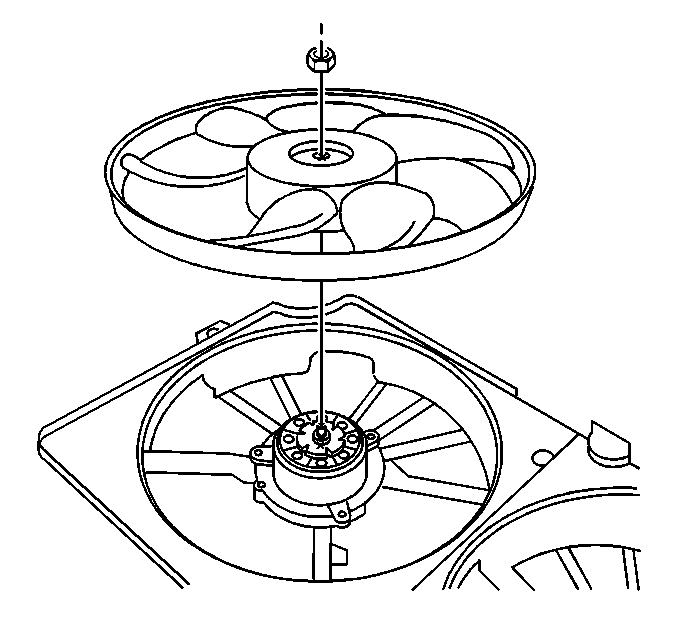
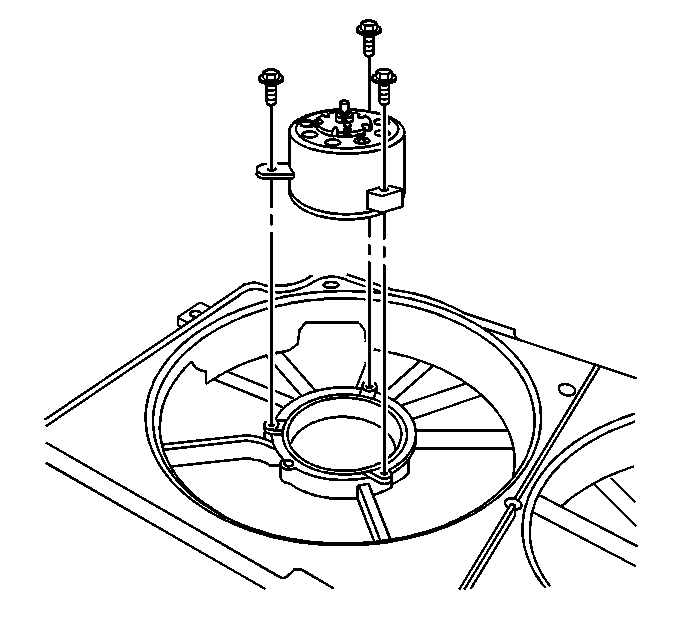
Installation Procedure
- Install the cooling fan motors.
- Install the cooling fan motor bolts.
- Install the cooling fan blades.
- Install the cooling fan blade nuts.
- Install the cooling fan shroud.
- Install the cooling fan shroud clip to the top of the radiator. Apply pressure in order to completely engage the clip onto the radiator.
- Install the cooling fan shroud bolts.
- Raise and support the vehicle. Refer to Lifting and Jacking the Vehicle in General Information.
- Install the push pin retainer to the lower left side of the fan shroud.
- Install the transmission oil cooler lines on to the retainer at the bottom of the cooling fan shroud.
- Lower the vehicle.
- Install the fan motor heat shields L36 and L67.
- Install the radiator upper support brackets and bolts that hold the fan shroud.
- Connect the cooling fan electrical connector.
- Install the radiator inlet hose to the radiator.
- Install the air cleaner and duct assembly. Refer to Air Cleaner Assembly Replacement in Engine Controls - 3.1L or Air Cleaner Assembly Replacement in Engine Controls - 3.8L.
- Install the PCM harness on to the fan shroud clip.
- Install the LH and RH engine mount strut braces. Refer to Engine Mount Strut Replacement in Engine Mechanical - 3.1L or Engine Mount Strut Replacement - Right Side and Engine Mount Strut Replacement - Left Side in Engine Mechanical - 3.8L.
- Fill the cooling system. Refer to Cooling System Draining and Filling .
- Connect the negative battery cable. Refer to Battery Negative Cable Disconnection and Connection in Engine Electrical.

Notice: Use the correct fastener in the correct location. Replacement fasteners must be the correct part number for that application. Fasteners requiring replacement or fasteners requiring the use of thread locking compound or sealant are identified in the service procedure. Do not use paints, lubricants, or corrosion inhibitors on fasteners or fastener joint surfaces unless specified. These coatings affect fastener torque and joint clamping force and may damage the fastener. Use the correct tightening sequence and specifications when installing fasteners in order to avoid damage to parts and systems.
Tighten
Tighten the bolts to 6 N·m (53 lb in).

Tighten
Tighten the nuts to 6 N·m (53 lb in).

Notice: Use the correct fastener in the correct location. Replacement fasteners must be the correct part number for that application. Fasteners requiring replacement or fasteners requiring the use of thread locking compound or sealant are identified in the service procedure. Do not use paints, lubricants, or corrosion inhibitors on fasteners or fastener joint surfaces unless specified. These coatings affect fastener torque and joint clamping force and may damage the fastener. Use the correct tightening sequence and specifications when installing fasteners in order to avoid damage to parts and systems.
Tighten
Tighten the bolts to 6 N·m (53 lb in).

Tighten
Tighten the bolts to 10 N·m (89 lb in).

